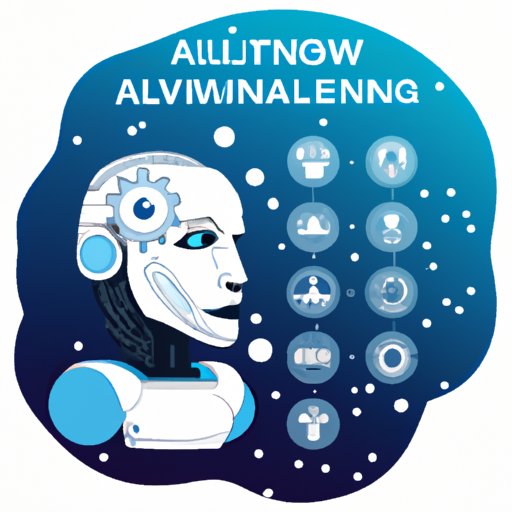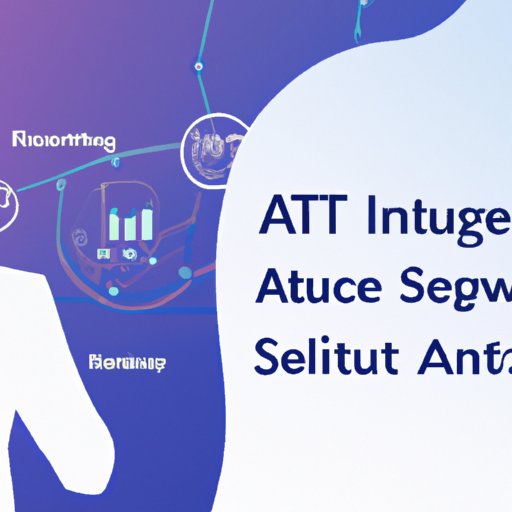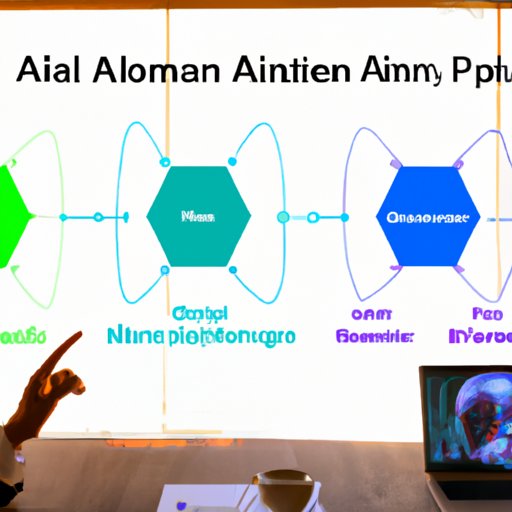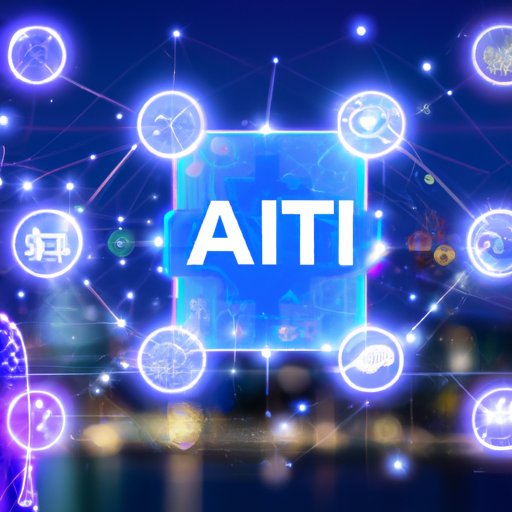Introduction
Artificial intelligence (AI) is transforming the way we live and work. AI refers to the simulation of human intelligence processes by machines, such as computers, robots, and other forms of digital technology. AI software is a type of computer program that enables machines to learn from past experiences, identify patterns in data, and make decisions with minimal human intervention. In this article, we’ll explore what AI software is, the various types of AI software available, and how AI software is revolutionizing industry.

A Comprehensive Guide to Artificial Intelligence Software
AI software is used to automate tasks and processes that would otherwise require human input. AI software can be divided into two main categories: supervised and unsupervised learning. Supervised learning involves training an AI system with labeled data, while unsupervised learning involves training an AI system without labeled data.
Advantages of using AI software include improved accuracy and efficiency, reduced costs, increased productivity, and increased customer satisfaction. However, there are some potential drawbacks to using AI software, such as the complexity of algorithms, the potential for bias, and the risk of data breaches.
Exploring the Top 10 Most Popular Software for AI
The following is a list of the top 10 most popular software for AI:
- TensorFlow
- Microsoft Azure Machine Learning Studio
- Amazon Machine Learning
- Google Cloud Platform
- IBM Watson
- Azure Cognitive Services
- SAP Leonardo
- Apache Spark
- Keras
- OpenCV
TensorFlow is an open-source machine learning platform developed by Google. It is designed for large-scale data processing and has been used in many applications, including natural language processing and image recognition. Microsoft Azure Machine Learning Studio is a cloud-based AI development platform, providing users with the tools to build, deploy, and manage AI models. Amazon Machine Learning is a cloud-based service that provides users with tools to create predictive models and generate insights from data. Google Cloud Platform is a suite of cloud computing services that includes Google’s AI and machine learning capabilities. IBM Watson is a cognitive computing platform that uses natural language processing and machine learning to power applications. Azure Cognitive Services is a suite of AI-powered services that allow developers to easily integrate AI into their applications. SAP Leonardo is an end-to-end digital innovation system that combines advanced technologies, such as AI and blockchain, to help businesses innovate quickly and efficiently. Apache Spark is a unified analytics engine for big data processing, providing high-level APIs for a variety of programming languages. Keras is an open-source neural network library written in Python. OpenCV is an open-source computer vision library that provides algorithms for real-time image processing.

AI Software: An Overview of the Benefits and Drawbacks
AI software offers numerous benefits, such as improved accuracy, increased efficiency, cost savings, increased productivity, and increased customer satisfaction. AI software can also be used to automate mundane tasks, freeing up employees to focus on more important tasks. Additionally, AI software can provide businesses with valuable insights into customer behavior, allowing them to better tailor their products and services to meet customer needs.
However, there are some potential drawbacks to using AI software. AI algorithms can be complex, making it difficult to debug and maintain. Additionally, AI systems can be prone to bias due to the data they are trained on, which can lead to inaccurate or unfair results. Finally, AI systems can be vulnerable to data breaches, making it important for businesses to ensure that their AI systems are secure.
How AI Software is Revolutionizing Industry
AI software is transforming the way businesses operate, from retail to healthcare and beyond. In the retail sector, AI software is being used to improve customer experience, such as through automated checkout systems and personalized product recommendations. In healthcare, AI software is being used to diagnose diseases and predict patient outcomes. In manufacturing, AI software is being used to optimize production processes and increase efficiency. AI software is also being used in transportation, finance, and other industries.
The use of AI software is also having a major impact on society. AI software is being used to develop autonomous vehicles, which could revolutionize the way we travel. AI software is also being used to automate mundane tasks, such as sorting mail and processing paperwork, freeing up employees to focus on more meaningful work. Additionally, AI software is being used to analyze large amounts of data and uncover patterns and insights that can be used to inform decision-making.

Comparing Leading AI Software Solutions on the Market
The following table compares some of the leading AI software solutions on the market:
| Software | Pros | Cons |
|---|---|---|
| TensorFlow | Open-source; flexible; powerful | Complex algorithms; steep learning curve |
| Microsoft Azure Machine Learning Studio | Easy to use; powerful; scalability | Expensive; limited features |
| Amazon Machine Learning | Easy to use; low cost; scalability | Limited features; slow training time |
| Google Cloud Platform | Wide range of features; powerful; scalability | Expensive; complex algorithms |
| IBM Watson | Flexible; powerful; scalability | Expensive; complex algorithms |
TensorFlow is an open-source machine learning platform developed by Google, offering powerful algorithms and flexibility. Microsoft Azure Machine Learning Studio is an easy-to-use cloud-based AI development platform, providing users with the tools to build, deploy, and manage AI models. Amazon Machine Learning is a cloud-based service that provides users with tools to create predictive models and generate insights from data. Google Cloud Platform is a suite of cloud computing services that includes Google’s AI and machine learning capabilities. IBM Watson is a cognitive computing platform that uses natural language processing and machine learning to power applications.
Conclusion
In conclusion, AI software has the potential to revolutionize the way we live and work. AI software can automate mundane tasks and processes, freeing up employees to focus on more meaningful work. AI software can also provide businesses with valuable insights into customer behavior, allowing them to better tailor their products and services to meet customer needs. There are numerous types of AI software available, each with its own advantages and disadvantages. The best AI software solution will depend on the specific needs of the business. This article has provided a comprehensive guide to AI software and how it is revolutionizing industry.
(Note: Is this article not meeting your expectations? Do you have knowledge or insights to share? Unlock new opportunities and expand your reach by joining our authors team. Click Registration to join us and share your expertise with our readers.)
